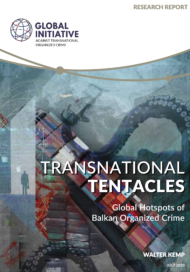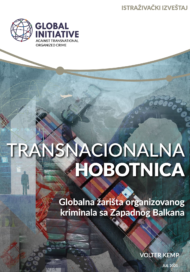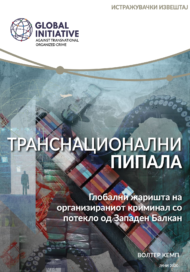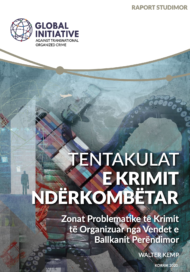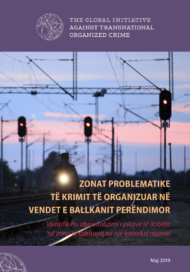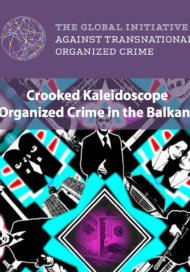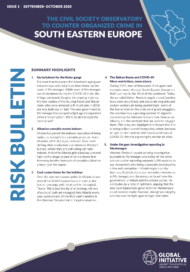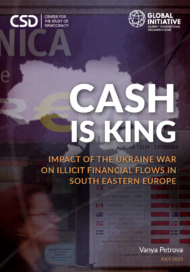While the Western Balkans is often portrayed as a hotspot of illicit activity, the region is a relatively small market for organized crime. The big money is made elsewhere. This report shows why and how groups from the Western Balkans have become engaged in organized crime abroad, particularly in South Africa, Turkey, Australia as well as in some countries of Latin America and Western Europe.
The report shows that criminal groups from the Western Balkans operating abroad are modern, dynamic and entrepreneurial. They have demonstrated an ability to adapt and innovate and use technology to their advantage: for example, using encrypted forms of communication; exploring new routes and means of trafficking, such as ‘narco-jets’; and laundering their money through cryptocurrencies, offshore havens and into their home countries.
The report suggests that there is not a ‘Balkan Cartel’ per se, although groups from the region sometimes work with each other, and there are also instances of multi-ethnic groups.
The report calls for more effective law enforcement cooperation, tracking and seizing of assets, and the sharing of information, not least since perpetrators tend to use multiple identities. It also stresses the need to reduce demand for the goods and services provided by criminal groups from the Western Balkans.
I dok je Zapadni Balkan često prikazivan kao žarište nelegalnih aktivnosti, region je relativno malo tržište za organizovani kriminal. Veliki novac se zarađuje na drugim mestima. Ovaj izveštaj pokazuje zašto i kako su se grupe sa Zapadnog Balkana uključile u organizovani kriminal u drugim državama, posebno u Južnoj Africi, Turskoj, Australiji, ali i nekim zemljama u Latinskoj Americi i u Zapadnoj Evropi.
U ovom izveštaju kriminalne grupe sa Zapadnog Balkana koje deluju van granica ovog regiona su prikazane kao moderne, dinamične i preduzetne. Dokazale su da su sposobne da se prilagođavaju, prihvataju novotarije i koriste tehnologiju u sopstvenu korist: na primer, korišćenjem šifrovanih formi komunikacije; istražuju nove rute i načine krijumčarenja, poput „narko-aviona“ i peru novac preko kriptovaluta, ofšor zona i ulaganjem u zemlje porekla.
U izveštaju se navodi da ne postoji „Balkanski kartel“ kao takav, iako grupe iz regiona rade jedne s drugima povremeno, takođe postoje i multietničke grupe.
Autori izveštaja pozivaju da se stvori efikasnija saradnja između agencija koje sprovode zakon, zatim da se imovina prati i zaplenjuje, a informacije dele, ne samo zbog toga što kriminalci koriste različite identite. Takođe se naglašava da je neophodno smanjiti potražnju sa robom i uslugama koje pružaju kriminalne grupe sa Zapadnog Balkana.
Иако Западен Балкан често се претставува како жариште на недозволена активност, регионот е релативно мал пазар за организираниот криминал. Големите пари лежат на друго место. Овој извештај покажува зошто и како групите од Западен Балкан се вплеткал во организираниот криминал во странство, особено во Јужна Африка, Турција, Австралија, како и во некои земји од Латинска Америка и Западна Европа.
Извештајот покажува дека криминалните групи од Западен Балкан кои оперираат во странство се модерни, динамични и со претприемачки дух. Покажале способност да се прилагодуваат, да воведуваат иновации и да користат технологија за остварување на своите цели: на пример, користење енкриптирани форми на комуникација; истражување нови рути и средства за недозволена трговија, како на пример „нарко-авиони“; и перење на парите преку криптовалути, оф-шор засолништа и во своите матични земји.
Извештајот сугерира дека не постои единствен „Балкански картел“ сам по себе, иако групите од регионот понекогаш соработуваат, а има и примери на мултиетнички групи.
Извештајот апелира за по делотворна соработка помеѓу органите на прогонот, следење и заплена на средства, како и споделување информации, особено затоа што сторителите често користат повеќе идентитети. Исто така ја истакнува потребата од намалување на побарувачката за стоките и услугите што ги обезбедуваат криминалните групи од Западен Балкан.
Ndonëse Ballkani perëndimor shpesh portretizohet si vatër e nxehtë e aktiviteteve të paligjshme, ky rajon paraqet një treg relativisht të vogël për krimin e organizuar. Fitimet e mëdha sigurohen në zona të tjera. Ky raport tregon se si dhe përse grupe nga Ballkani perëndimor u përzien në aktivitete të krimit të organizuar në vende të huaja, veçanërisht në Afrikën e Jugut, Turqi, Australi, si dhe në disa vende të Amerikës Latine dhe Evropës perëndimore.
Raporti tregon se grupe kriminale nga Ballkani perëndimor, që zhvillojnë aktivitetet e tyre jashtë rajonit, janë modernë, dinamikë, dhe të zgjuar. Këto grupe kanë treguar aftësi për t’u përshtatur, për të gjetur rrugë e mënyra të reja, dhe për të përdorur teknologjinë në avantazh të tyre: si për shembull, përdorimi i formave të koduara të komunikimit; eksplorimi i korridoreve dhe mënyrave të reja të trafikimit, si ‘narko-avionët’; pastrimi i parave nëpërmjet kriptomonedhave, parajsave financiare, dhe në vendet e tyre të origjinës.
Raporti del me mendimin se nuk ka një ‘kartel ballkanik’, ndonëse grupe të ndryshme kriminale nga rajoni bashkëpunojnë më njëri-tjetrin, madje ka edhe grupe multietnike.
Raporti bën thirrje për bashkëpunim më të efektshëm midis forcave të ruajtjes së rendit; për identifikimin dhe konfiskimin e pasurive të kriminelëve; si dhe për shkëmbimin e informacionit midis forcave policore, edhe ngaqë kriminelët zakonisht përdorin nga disa identitete të rreme. Raporti gjithashtu vë në dukje nevojën për reduktimin e kërkesës për mallra dhe shërbime që ofrohen nga grupe kriminale të Ballkanit perëndimor.
